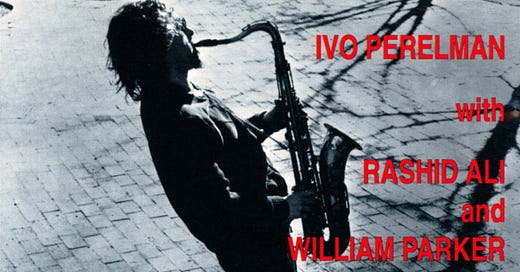This week, the Leo Records digital reissue campaign shifts into a new gear, as we begin rolling out the catalog of Brazilian tenor saxophonist Ivo Perelman. Between 1997 and 2017, he released more than 60 albums on Leo, with a stunning range of collaborators, most notably pianist Matthew Shipp. And we’ve got 20 of his releases available now. But today, I want to specifically draw your attention to two of his earliest Leo recordings: 1997’s Sad Life and 1999’s Brazilian Watercolour.
Both of these albums were recorded at the now-defunct Systems Two studio in Brooklyn in 1996 and 1997. Sad Life was first, a trio session with bassist William Parker and drummer Rashied Ali. Early in his career, before evolving into the pure improvisor he is today, Perelman frequently adapted Brazilian folk melodies into free jazz, and three of those pieces — “Sad Life”, “Caiapó” and “Alagoana” — are heard here.
Critic Maciej Lewenstein called Sad Life “a true breakthrough record… a clear masterpiece of the post-Coltrane era… a permanent explosion and eruption of expressive energy, collaborative spirit and perhaps unexpected lyricism” and described it as “one of my favorite free jazz sax trio records… not a single dull moment and keeps the attention of the listener from the opening title track through the absolutely incredible ‘Life Forms’”.
Brazilian Watercolour is unusual for Perelman, as it contains tracks from two different sessions. In January 1996, he recorded Bendito of Santa Cruz, an album almost entirely composed of adapted folk melodies, with pianist Matthew Shipp. That album was released on Cadence Jazz. Five more tracks from that session made it onto Brazilian Watercolour. They sit alongside six tracks featuring Ali and two Brazilian percussionists, Cyro Baptista and Guilherme Franco. To make things even more interesting, Perelman himself plays piano on two pieces, “Rimbotim” and “Pandeiros”, and recorder on the 71-second “Flauting” (on which Baptista and Franco play flutes).
Glenn Astarita reviewed the album for AllAboutJazz, writing, “His energy level may rival that of American saxophonist David S. Ware; however, Perelman’s uniqueness lies within his South American roots and latter-day Trane or Albert Ayler modernistic approach”. He concluded, “Ivo Perelman is a bona fide modern jazz stylist and in Brazilian Watercolour, he proves his case, combining ethnic diversity with enterprising concepts which forms a near-perfect union of dissimilar genres.”
“Playing with Rashied Ali was like immersing in the ’60s and breathing the same air as Coltrane did”, Perelman told me via email. “Ali’s music was that powerful.” Hearing them work together, particularly on Sad Life, is astonishing. Ali’s pulsating time is as precise yet omnidirectional as it was with Coltrane; he skitters and patters around the kit, creating what can feel like five or six layers of rhythm at once, but it all adds up to a wide-open space for Perelman to roam, as Parker glues the music together, often with a keening bow.
Bob Osborne will be presenting tracks from these first 20 Perelman reissues all month long on his radio show, World of Jazz; the first episode to feature Ivo’s music will be up on April 6, and you’ll be able to stream it via Osborne’s newsletter.
Check out all 20 Perelman reissues now on Bandcamp.
The rest of today’s newsletter is for paying subscribers, who will get articles on the art of Daniel Goldstein; Andy Warhol’s religious faith; a brand-new city in China; something about commas (really!); and essays on Black Flag and Tate McRae. Everyone else, I’ll see you on Tuesday, when we’ll be discussing a new album of string quartet performances of the music of Julius Hemphill. Thank you as always for reading and subscribing.
Keep reading with a 7-day free trial
Subscribe to Burning Ambulance to keep reading this post and get 7 days of free access to the full post archives.




